|
|
|
Sort Order |
|
|
|
Items / Page
|
|
|
|
|
|
|
| Srl | Item |
| 1 |
ID:
173790
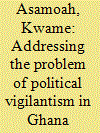

|
|
|
|
|
| Summary/Abstract |
Ghana entered into the Fourth Republic in 1993 after experiencing political instability over two decades. A defining feature that has characterized the Fourth Republic of Ghana and marred Ghana’s democratic credentials is the emergence of political vigilantism. Political vigilantism has basically been perpetuated by the two leading political parties in Ghana: the New Patriotic Party and National Democratic Congress. The major political actors in the political system of Ghana continue to express the debilitating effects of political vigilantism on Ghana’s democratic advancement, nevertheless, it continues to persist in monumental proportion in our political dispensation. Using a qualitative research approach, the paper examines the factors responsible for the pervasiveness of political vigilantism under the Fourth Republic of Ghana and proffer some plausible solutions to address this political canker.
|
|
|
|
|
|
|
|
|
|
|
|
|
|
|
|
| 2 |
ID:
173788


|
|
|
|
|
| Summary/Abstract |
This article frames a discussion on how South African universities and communities can co-create university spaces that facilitate repairing the country’s dented social, economic and political infrastructure through engaged creative-placemaking. The first section further explores the concept followed by a discussion of historical issues which have a material bearing on how universities can and should frame community engagement in South Africa. It pays close attention to how post-apartheid nation building is hindered by the remnants from the past and is dislocated to both the present and the future. The article also brings into question the type and role of leadership, in both universities and communities. The final section of the article presents a framework for engaged creative-placemaking delineating the antecedents that are needed by the key stakeholders, namely, public and private enterprises, university and the community to successfully work together in achieving a just society through creative-placemaking. Improving place liveability through engaged creative-placemaking has the potential to stimulate local economies and leads to cultural diversity, civic engagement and increased innovation.
|
|
|
|
|
|
|
|
|
|
|
|
|
|
|
|
| 3 |
ID:
173786
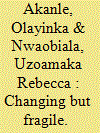

|
|
|
|
|
| Summary/Abstract |
Even though the phenomenon of female family support may not be entirely new in Africa, breadwinning is the primary role of men in most African societies. However, as more women get education and enter paid employment, and some men lose jobs, traditional breadwinning roles are challenged and, sometimes, inverted as growing numbers of women become family breadwinners. Female breadwinning may not be without implications for family stability, however, as it confronts instituted normative gender order in patriarchal societies. While female breadwinners are increasingly common in industrialized societies, and literature exists on their trajectories in such contexts, more recent works are needed in Africa, particularly Nigeria. This article, therefore, examines the nexus of female breadwinning and family stability in Nigeria. This article is an important one on a growing phenomenon in Africa resulting from urbanization, industrialization and economic crises in certain regions of the continent. Guided by modernization and patriarchy theories, the study relied on qualitative method of data collection. Twenty in-depth interviews (IDIs) were conducted in contexts of female breadwinning families. Data were analysed and presented as interpretive narratives. An interesting relationship was found between female breadwinning and family stability in the setting. Generational influences and associated outcomes were also found and presented in this article.
|
|
|
|
|
|
|
|
|
|
|
|
|
|
|
|
| 4 |
ID:
173789
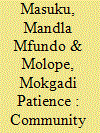

|
|
|
|
|
| Summary/Abstract |
In South Africa, community members have the constitutional right to partake in local governance and the local municipal council has the constitutional mandate to facilitate community participation. Qualitative research was used to assess the impact of power relations on community participation in the Mahikeng Local Municipality. The study findings indicate that power differentials contributed to the abandonment of the legislative provisions in the Mahikeng Local Municipality in the North-West Province of South Africa. Among other things, this paper recommends finalisation of the draft public participation framework. The framework should clearly identify and define the roles of the community, elected councillors and traditional authorities. The paper recommends the development of a strategy that includes clear and comprehensive public participation guidelines, protocols and processes to facilitate implementation of the framework. In consultation with the community, a detailed community participation schedule must be developed, implemented and continuously monitored and evaluated.
|
|
|
|
|
|
|
|
|
|
|
|
|
|
|
|
| 5 |
ID:
173782
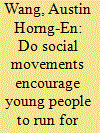

|
|
|
|
|
| Summary/Abstract |
The 2014 Sunflower Movement led to rising political participation among young Taiwanese. Hence, opposition parties and civic groups created programs to support young candidates running in the village chief elections. Compared with the 2010 election, however, fewer young challengers ran in 2014, and they received fewer votes and won fewer seats. Propensity score matching shows that the presence of young candidates on ballots did not increase turnout. However, young candidates affected the election indirectly: young, new candidates attracted more votes from incumbents than from challengers and therefore decreased the incumbent re-election rate.
|
|
|
|
|
|
|
|
|
|
|
|
|
|
|
|
| 6 |
ID:
173783
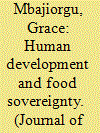

|
|
|
|
|
| Summary/Abstract |
Food security strategies are determined by the prevailing realities within households and communities. Therefore, it is not surprising that in South Africa agricultural transformation is an important food security strategy. This article examines the role of human development and food sovereignty in fostering conditions that enable rural households to enhance their food security capabilities. Using an in-depth analysis of literature, national, regional and international instruments, this article takes its departure from the fact that subsistence agriculture is an effective strategy for improving household food needs when implemented within the broader human rights framework of human development. The results reveal that agriculture has the potential to increase household food security if appropriate agricultural technologies and productive resources such as land are made accessible to households. Further, for agriculture to attain optimal efficiency as a food security strategy, policies on agrarian transformation should be implemented within broader social development programmes.
|
|
|
|
|
|
|
|
|
|
|
|
|
|
|
|
| 7 |
ID:
173785
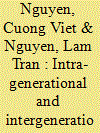

|
|
|
|
|
| Summary/Abstract |
This study examines intra-generational and intergenerational mobility of employment and income in Vietnam during the 2004–2014 period. It finds there was high mobility across occupations but less mobility across wage-job employment and economic sectors. Upward labour mobility increased over time because of the increase in skilled occupations. The intergenerational elasticity of earnings is estimated at around 0.36. Education plays an important role in increasing intra-generational as well as intergenerational mobility. The earning intergenerational elasticity for children with less than primary education is rather high, at 0.51, while this intergenerational elasticity for those with a college or university degree is much lower at 0.17.
|
|
|
|
|
|
|
|
|
|
|
|
|
|
|
|
| 8 |
ID:
173787
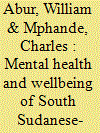

|
|
|
|
|
| Summary/Abstract |
The majority of South Sudanese-Australians arrived in Australia, and other host countries outside Africa, after spending a greater part of their lives in refugee camps or conflict-affected areas. In addition, refugees are often not able to return to their home countries because the causes of their departure (wars, insecurity, hunger) continue to apply in their country of origin. The purpose of this paper is to examine some of the mental health and wellbeing issues some South Sudanese-Australians experience as a result of settlement difficulties and their earlier experience of conflict. The study looks at experiences of resettlement and settlement difficulties, and, more importantly, mental health and wellbeing issues in the wake of the aforesaid challenges. The data was collected from a qualitative method which comprised a series of semi-structured, one-on-one interviews with a total of 20 South Sudanese-Australians living in Melbourne. There were 11 males and nine females, with ages ranging from 18 to 64 years, who volunteered to participate in this study. Findings indicated that, as with many other people from refugee backgrounds, South Sudanese-Australians face a range of settlement-related challenges, and a host of post-resettlement adaptation experiences such as limited change of gender roles, language proficiency, unemployment, host society unacceptance or intolerance, constrained recreational opportunities, lack of community connectedness and overall mental health and general wellbeing issues. Experiencing conflict can be traumatic and refuge in neighbouring countries that are socio-culturally different can be challenging. In conclusion, these issues can not only be troublesome on a day-to-day basis, but also adversely affect the long-term mental health and wellbeing of refugees.
|
|
|
|
|
|
|
|
|
|
|
|
|
|
|
|
| 9 |
ID:
173784


|
|
|
|
|
| Summary/Abstract |
Water scarcity is increasing in South Africa and communities need to be educated about water conservation practices. This article investigated the perceptions of Raymond Mhlaba Local Municipality’s residents concerning the use of social media for water conservation education in their community. Through a quantitative methodology, a sample of 383 respondents answered a questionnaire and the main findings were that 75 per cent of respondents did not know about the municipality’s social media platforms. This article recommends that the municipality creates awareness about its social media platforms, increases social media usage and employs persuasive strategies for participation.
|
|
|
|
|
|
|
|
|
|
|
|
|
|
|
|
|
|
|
|
|